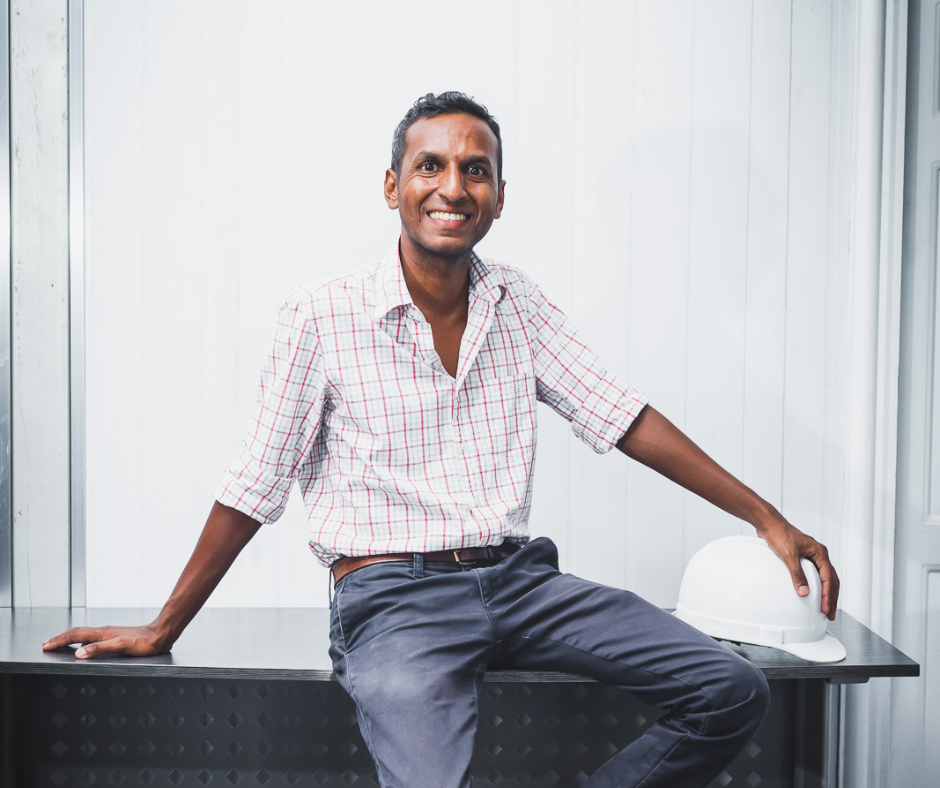How can we give a second life to our electronic equipment in Mauritius? A pioneer in e-waste recycling (Waste Electrical and Electronic Equipment – WEEE), BEM Recycling has been helping businesses and individuals transform electronic waste into valuable resources for over 30 years. Through strong partnerships and innovative initiatives, BEM is a driving force behind the country’s circular economy. We sat down with Thierry Malabar, Project Manager at BEM Recycling, for an exclusive interview.
A Journey Rooted in Environmental Commitment
Hello Thierry, can you introduce yourself and explain your role at BEM Recycling?
I’ve been working as Project Manager at BEM Recycling for almost 12 years. My role is to liaise between our partners, both in the public & private sectors and our company, and to help businesses adopt responsible recycling practices.
What was your background before joining BEM?
I pursued university studies in Environmental Management and Sustainable Development, completing a Master’s degree at the University of Nice-Sophia Antipolis. Joining the family business, which has been operating for over 30 years, was a natural step aligned with my personal values.
What motivated you to work specifically in the e-waste recycling sector?
Beyond the family history, managing e-waste is a critical challenge if we want to reduce the environmental footprint of our tech-driven lifestyles. It requires expertise and a strong commitment, that’s what I wanted to bring to the company.
BEM’s Mission: Raising Awareness, Supporting, and Transforming
What do you see as BEM Recycling’s core mission in today’s Mauritian context?
First and foremost, we focus on raising awareness: encouraging people to repair, donate, and as a last resort, recycle. Every action count in extending the life of equipment and reducing environmental impact.
What sets BEM apart from other recycling players on the island?
We have over 30 years of experience and have made significant investments in state-of-art equipment. Our approach is built on professionalism, rigor, and the ability to support our partners in the long term.
Driving the Circular Economy Forward
BEM is often cited as a key player in Mauritius’ circular economy. What does this concept mean to you?
It’s a team effort above all. Circularity requires collaboration between manufacturers, social enterprises, NGOs… We firmly believe that only a collective approach can help Mauritius move forward on this path.
Can you tell us about some of your key partnerships?
We are deeply grateful to all our partners: Mission Verte, Emtel, Maurilait, We-Recycle, The Charity Centre, The Good Shop, and many others. These partnerships are crucial in helping us expand our initiatives and reach wider audiences across the island.
The HDPE micro-factory launched in 2025 is a great example of innovation. What was BEM’s contribution?
We have proposed solutions to repurpose certain electronic products/components to facilitate the drying of HDPE plastic (used in food packaging) after it has been crushed and washed. This project demonstrates the power of collaboration, bringing together private companies, NGOs, and technical experts (Maurilait, We-Recycle, Mautopia, Plastic Odyssey, Hi-Techno Lab and others). The circular economy is an ongoing space for innovation.
Challenges and Levers for the Future
What are the main challenges you face in e-waste management in Mauritius?
The biggest challenge remains raising awareness. Many citizens still don’t realize that e-waste is hazardous if not properly treated. Education, communication, and fieldwork are key to changing this.
How does BEM help raise awareness among the public and businesses?
We run many educational campaigns, such as the Emtel Roadshows in various malls (Phoenix Mall, Mahogany Mall, etc.). We also created our mascot, Recycle Hero, to engage younger audiences through fun, educational activities.
What regulatory changes would help accelerate the circular economy?
A clear regulatory framework introducing Extended Producer Responsibility (EPR) would help structure the sector and encourage all stakeholders to consider the full lifecycle of their products. It’s a key lever for embedding good practices.
Positive Momentum and Strong Ambitions
What recent initiative has made you particularly proud?
The strong turnout at our collection events beginning 2025 with the Emtel Roadshows— such as those at Phoenix Mall and Mahogany Mall — proves that when we communicate effectively and make recycling convenient, people do take action. That’s very encouraging.
How do you see e-waste recycling evolving in Mauritius over the next 5 to 10 years?
Public awareness is growing. We’re seeing it during our campaigns — more and more Mauritians are becoming sensitive to environmental issues. Going forward, we’ll need to continue fostering a culture of source separation and professionalize the sector even further.
What are BEM’s next strategic steps?
We’ll keep listening to our partners and collaborators, continue investing in R&D, and leverage new technologies to improve our processes. Digital tools and ICT innovations will play an increasingly important role in this transformation.
BEM Recycling: A Commitment That Endures
With its strong partnerships, unique expertise on the island, and unwavering commitment to innovation, BEM Recycling is now an essential player in Mauritius’ circular economy.
Every action counts: businesses, individuals, communities… together, we can help build a cleaner and more sustainable island.
Where to drop off your e-waste in Mauritius
6 partner collection points for your used electronic equipment:
- BEM Recycling – La Chaumière (all types of e-waste)
- The Good Shop – Petite Rivière, Curepipe, New Grove (small & medium size e-waste)
- The Good Shop – Calebasses (all types of e-waste)
- The Charity Centre – Tamarin (all types of e-waste)
For larger quantities or if transport is required, please contact our team. Recycling fees apply depending on volume and logistics.
